中西方文化差异
中西方文化的主要区别是什么?

中西方文化的主要区别是什么?一、价值观念的差异中西方文化价值观念的差异较为显著。
中华文化强调团队合作、传统文化、家庭观念,尊重长辈,有着悠久历史的传统美德。
而西方文化则强调个人主义、人权、利益至上、重视民主自由。
1、家庭观念家庭在中国文化里有着非常重要的地位,一家人会尊重长辈,有责任照顾家人。
而在西方文化里,独立和个人的自由和权利更受重视,家庭并不如中国文化一样被视为社会的基础单位。
2、人权和民主西方文化倡导人权和民主,西方国家注重公民的个人权利,强调个人的自由和平等,为每个人提供平等的机会。
在中国文化里,虽然国家在这方面进行了一些改革,但仍然有许多不同于西方的特点。
二、思维方式的不同中西方人的思维方式有着明显的差异。
中国人相对更加注重内省和集体思维,强调借助集体智慧而不是独立判断,而西方文化则强调独立思考和批判思维。
1、传统观念和现代思维在中国文化里,许多人仍然保留着传统观念。
这种传统观念是一种内省的力量,可以帮助人们更好的理解世界。
而西方文化则更加注重现代思维,对于过去的经验、传统观念持有的态度较为谨慎。
2、群体思维和个体思维中国文化里有着集体思维的传统,许多人更愿意充分利用集体思维。
而西方文化则更加注重个体思维,更倾向于自己做出独立的判断和决策。
三、行为方式的异同中国和西方文化有着许多行为方式上的异同。
中国文化更加强调文明礼仪、尊重长辈,而西方文化则更多地侧重自由和快乐。
1、文明礼仪和表达方式在中国文化里,文明礼仪是一种值得尊重的行为方式。
尤其是在家庭和公共场合中,礼节非常重要。
而西方文化则更加注重直接、简单、直率的表达方式。
2、享受生活和慈善公益西方人看待生活方式的态度比较开放,观念较为自由,在生活中更注重享受生活的美好,花费时间和金钱去做自己喜欢的事情。
而在中国文化里,许多人将更多的关注点放在了慈善公益方面,关注社会问题,尝试在力所能及的范围内为社会贡献自己的一份力量。
综上所述,中西方文化的差异涉及到许多方面,例如价值观念、思维方式、行为方式等。
请列举东西方文化的十点差异
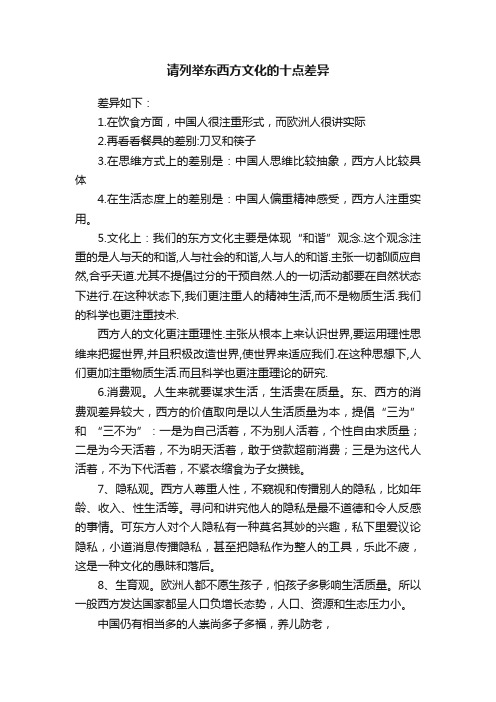
请列举东西方文化的十点差异差异如下:1.在饮食方面,中国人很注重形式,而欧洲人很讲实际2.再看看餐具的差别:刀叉和筷子3.在思维方式上的差别是:中国人思维比较抽象,西方人比较具体4.在生活态度上的差别是:中国人偏重精神感受,西方人注重实用。
5.文化上:我们的东方文化主要是体现“和谐”观念.这个观念注重的是人与天的和谐,人与社会的和谐,人与人的和谐.主张一切都顺应自然,合乎天道.尤其不提倡过分的干预自然.人的一切活动都要在自然状态下进行.在这种状态下,我们更注重人的精神生活,而不是物质生活.我们的科学也更注重技术.西方人的文化更注重理性.主张从根本上来认识世界,要运用理性思维来把握世界,并且积极改造世界,使世界来适应我们.在这种思想下,人们更加注重物质生活.而且科学也更注重理论的研究.6.消费观。
人生来就要谋求生活,生活贵在质量。
东、西方的消费观差异较大,西方的价值取向是以人生活质量为本,提倡“三为”和“三不为”:一是为自己活着,不为别人活着,个性自由求质量;二是为今天活着,不为明天活着,敢于贷款超前消费;三是为这代人活着,不为下代活着,不紧衣缩食为子女攒钱。
7、隐私观。
西方人尊重人性,不窥视和传播别人的隐私,比如年龄、收入、性生活等。
寻问和讲究他人的隐私是最不道德和令人反感的事情。
可东方人对个人隐私有一种莫名其妙的兴趣,私下里爱议论隐私,小道消息传播隐私,甚至把隐私作为整人的工具,乐此不疲,这是一种文化的愚昧和落后。
8、生育观。
欧洲人都不愿生孩子,怕孩子多影响生活质量。
所以一般西方发达国家都呈人口负增长态势,人口、资源和生态压力小。
中国仍有相当多的人崇尚多子多福,养儿防老,9。
竞争观上的差异一是要不要竞争。
中国的传统文化是封建的儒教文化为核心。
儒教强调中庸之道,过犹不及,以和为贵。
而市场经济则崇尚竞争,强调商战打败对手,赢得自己的发展。
从儒教看,竞争是不道德的。
欧洲人认为,社会需要竞争,人与人需要竞争,竞争出动力,竞争出人才,经济才会在多元化竞争中得到快速发展。
中西文化差异的主要表现
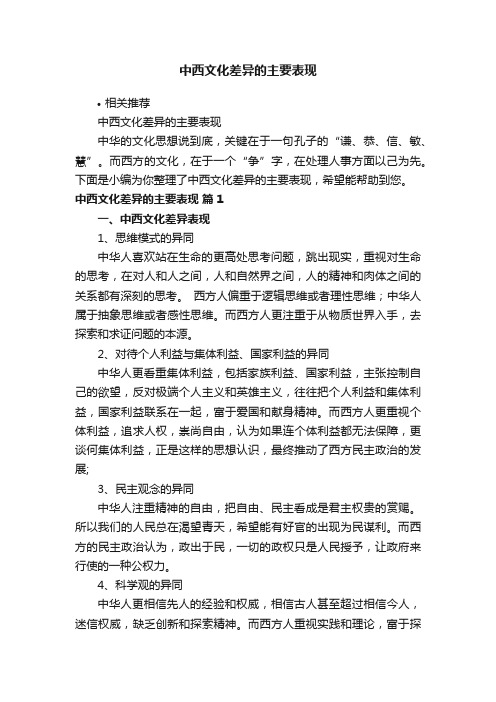
中西文化差异的主要表现•相关推荐中西文化差异的主要表现中华的文化思想说到底,关键在于一句孔子的“谦、恭、信、敏、慧”。
而西方的文化,在于一个“争”字,在处理人事方面以己为先。
下面是小编为你整理了中西文化差异的主要表现,希望能帮助到您。
中西文化差异的主要表现篇1一、中西文化差异表现1、思维模式的异同中华人喜欢站在生命的更高处思考问题,跳出现实,重视对生命的思考,在对人和人之间,人和自然界之间,人的精神和肉体之间的关系都有深刻的思考。
西方人偏重于逻辑思维或者理性思维;中华人属于抽象思维或者感性思维。
而西方人更注重于从物质世界入手,去探索和求证问题的本源。
2、对待个人利益与集体利益、国家利益的异同中华人更看重集体利益,包括家族利益、国家利益,主张控制自己的欲望,反对极端个人主义和英雄主义,往往把个人利益和集体利益,国家利益联系在一起,富于爱国和献身精神。
而西方人更重视个体利益,追求人权,崇尚自由,认为如果连个体利益都无法保障,更谈何集体利益,正是这样的思想认识,最终推动了西方民主政治的发展;3、民主观念的异同中华人注重精神的自由,把自由、民主看成是君主权贵的赏赐。
所以我们的人民总在渴望青天,希望能有好官的出现为民谋利。
而西方的民主政治认为,政出于民,一切的政权只是人民授予,让政府来行使的一种公权力。
4、科学观的异同中华人更相信先人的经验和权威,相信古人甚至超过相信今人,迷信权威,缺乏创新和探索精神。
而西方人重视实践和理论,富于探险精神,倡导理性思维。
通过正规的学院式教育对科学成果进行普及和推广,极大的促进了科学的发展,也最终建立了完整的科学体系;5、中西方的道德观是迥然不同的西方强调个体本位,而中华人提倡群体本位。
中西方道德观的不同,使中西方的伦理体系和道德规范具有了不同的特点:西方重契约,中华重人伦;西方重理智,中华重人情;西方伦理重于竞争,中华则偏重于中庸、和谐;西方的伦理道德是以人性恶为出发点,强调个体的道德教育,中华儒家是从人性善的观点出发,强调个体的道德修养。
浅析中西方文化的特点及差异

浅析中西方文化的特点及差异中西方文化的特点及差异主要体现在以下几个方面:一、价值观念的差异中西方文化在价值观念方面存在明显的差异。
中西方文化中的核心价值观念不同,导致了人们对于生活、工作、人际关系等方面的看法和态度亦不一样。
中西方文化的核心价值观念差异主要表现在以下几个方面:1.个人主义与集体主义:西方文化倾向于个人主义,注重个体的权利和自由;而中西方文化偏向于集体主义,注重集体的利益和和谐。
2.人际关系与权力结构:中西方文化在人际关系和权力结构上也有差异,西方文化更注重个人独立与自由,追求平等的权利;而中西方文化更注重人际关系的繁衍与互助,注重权力结构的稳定与层级。
3.时间观念:中西方文化的时间观念亦存在差异,西方文化较为注重现在,强调效率与精确性;而中西方文化则注重传统与历史,强调长远、循序渐进的过程。
二、沟通方式的差异中西方文化在沟通方式上也有较大的差异。
中西方文化在语言、表达方式、交往方式等方面存在明显的不同,主要表现在以下几个方面:1.语言差异:中西方文化在语言上有着明显的区别,西方注重逻辑和语义的准确性,而中式则侧重寓意和情感的表达。
2.交往方式:西方文化注重直接和开放的交往方式,喜欢直言不讳、直接表达;而中西方文化注重间接和含蓄的交往方式,喜欢借助隐喻、暗示等方式表达。
3.个人空间:西方文化注重个人空间与隐私,对他人的触碰和侵犯较为敏感;而中西方文化则较为包容,重视人与人之间的交流和互动。
三、日常生活的差异中西方文化在日常生活的方式和习惯上也存在差异。
这种差异主要体现在饮食习惯、礼仪规范、家庭观念等方面:1.饮食习惯:中西方文化在饮食方面存在较大的差异,西方文化偏向于多样化饮食,较为开放;而中西方文化则较为注重中餐,讲究色香味形具有医学养生的作用。
2.礼仪规范:中西方文化中的礼仪规范也存在明显差异,西方文化注重个人的自由和自我表达,较为随意;而中西方文化则更注重礼貌、尊重以及细节的呈现。
中西文化差异比较

中西文化差异比较中西文化是世界上最为重要的两个文化系统之一,它们在历史、宗教、价值观念、社会组织等方面存在着明显的差异。
下面将从不同角度进行比较。
1.历史与传统中西文化从历史和传统方面有很大的差异。
西方文化主要源于古希腊罗马文化,强调个体的权利和自由。
而中国文化则源于古代儒家文化,注重社会秩序、家庭和谐。
西方文化以发展和创新为主要动力,注重个体的自由和权利。
中国文化则更加强调集体和家庭的利益。
2.宗教与信仰宗教对于中西文化的影响也存在差异。
西方文化主要受到基督教的影响,强调个体与神的关系,并倡导人类平等和博爱。
中国文化则以儒家思想为主,注重人与人之间的关系和道德伦理的培养。
虽然现代中国有多种宗教信仰,如佛教、道教、伊斯兰教等,但儒家思想仍然对中国文化影响深远。
3.社会组织与价值观念中西社会组织和价值观念也有明显的差异。
西方社会以个人为单位进行组织,强调竞争和个人的权利。
而中国社会则更加强调集体,注重家庭和社群的利益。
在价值观念方面,西方文化主张自由、公平和个人主义,而中国文化强调稳定、和谐和集体主义。
4.沟通和交流方式中西文化在沟通和交流方面也存在差异。
西方文化注重直接和明确的表达,倾向于直接提出自己的意见和看法。
中国文化则更加注重间接和含蓄的表达,倾向于通过暗示和隐喻传达信息。
此外,在个人关系方面,西方文化注重私人空间和个人隐私,而中国文化注重团体互助和群体利益。
总的来说,中西文化存在明显的差异,包括历史、宗教、社会组织和沟通方式等方面。
这些差异反映了不同文化背景下的不同价值观念和思维方式。
了解和尊重这些差异是促进中西文化交流和合作的重要前提,有助于增进双方的相互理解和共识。
中西方文化差异总结
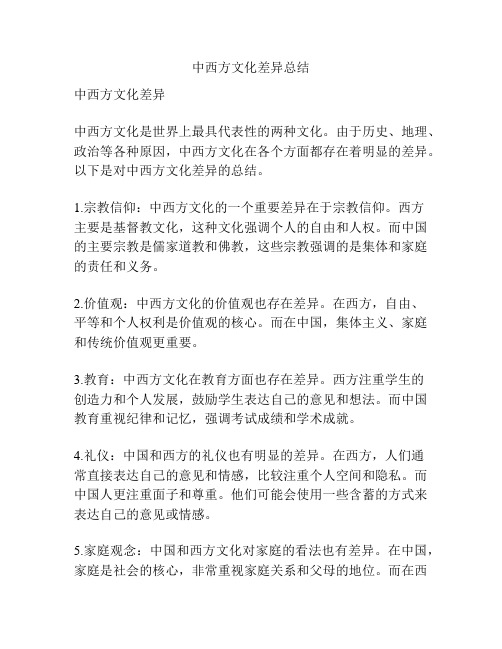
中西方文化差异总结中西方文化差异中西方文化是世界上最具代表性的两种文化。
由于历史、地理、政治等各种原因,中西方文化在各个方面都存在着明显的差异。
以下是对中西方文化差异的总结。
1.宗教信仰:中西方文化的一个重要差异在于宗教信仰。
西方主要是基督教文化,这种文化强调个人的自由和人权。
而中国的主要宗教是儒家道教和佛教,这些宗教强调的是集体和家庭的责任和义务。
2.价值观:中西方文化的价值观也存在差异。
在西方,自由、平等和个人权利是价值观的核心。
而在中国,集体主义、家庭和传统价值观更重要。
3.教育:中西方文化在教育方面也存在差异。
西方注重学生的创造力和个人发展,鼓励学生表达自己的意见和想法。
而中国教育重视纪律和记忆,强调考试成绩和学术成就。
4.礼仪:中国和西方的礼仪也有明显的差异。
在西方,人们通常直接表达自己的意见和情感,比较注重个人空间和隐私。
而中国人更注重面子和尊重。
他们可能会使用一些含蓄的方式来表达自己的意见或情感。
5.家庭观念:中国和西方文化对家庭的看法也有差异。
在中国,家庭是社会的核心,非常重视家庭关系和父母的地位。
而在西方,个人独立和自主性较为重要,家庭更多是一个相互支持的单位。
6.时间观念:时间观念也是中西方文化差异的一个方面。
西方文化注重时间的准确性和效率。
西方人通常会尽量按时完成任务,而中国人对时间可能会更加灵活,他们注重与人的交流和关系。
7.食物和饮食习惯:中国和西方的饮食习惯也有明显的差异。
中国人注重荤素搭配,重视米饭和粥类食品。
而西方人更强调肉类和面食,蔬菜和主食的比例可能较低。
8.婚姻观念:中西方文化对婚姻的看法也有差异。
中国文化中婚姻被看作是家庭的延续和传承。
在中国,父母对子女的婚姻有较大的影响力。
而在西方,个人选择和幸福感更重要,婚姻更多是两个人自由选择的结果。
总结起来,中西方文化在宗教信仰、价值观、教育、礼仪、家庭观念、时间观念、食物和饮食习惯以及婚姻观念等方面存在差异。
这些差异反映了中西方文化的不同历史、地理和社会背景,也是两种文化在长期发展中的产物。
中西方文化的差异
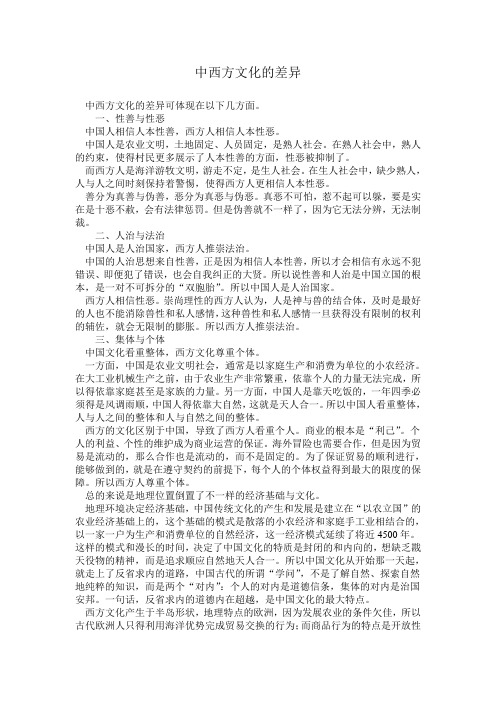
中西方文化的差异中西方文化的差异可体现在以下几方面。
一、性善与性恶中国人相信人本性善,西方人相信人本性恶。
中国人是农业文明,土地固定、人员固定,是熟人社会。
在熟人社会中,熟人的约束,使得村民更多展示了人本性善的方面,性恶被抑制了。
而西方人是海洋游牧文明,游走不定,是生人社会。
在生人社会中,缺少熟人,人与人之间时刻保持着警惕,使得西方人更相信人本性恶。
善分为真善与伪善,恶分为真恶与伪恶。
真恶不可怕,惹不起可以躲,要是实在是十恶不赦,会有法律惩罚。
但是伪善就不一样了,因为它无法分辨,无法制裁。
二、人治与法治中国人是人治国家,西方人推崇法治。
中国的人治思想来自性善,正是因为相信人本性善,所以才会相信有永远不犯错误、即便犯了错误,也会自我纠正的大贤。
所以说性善和人治是中国立国的根本,是一对不可拆分的“双胞胎”。
所以中国人是人治国家。
西方人相信性恶。
崇尚理性的西方人认为,人是神与兽的结合体,及时是最好的人也不能消除兽性和私人感情,这种兽性和私人感情一旦获得没有限制的权利的辅佐,就会无限制的膨胀。
所以西方人推崇法治。
三、集体与个体中国文化看重整体,西方文化尊重个体。
一方面,中国是农业文明社会,通常是以家庭生产和消费为单位的小农经济。
在大工业机械生产之前,由于农业生产非常繁重,依靠个人的力量无法完成,所以得依靠家庭甚至是家族的力量。
另一方面,中国人是靠天吃饭的,一年四季必须得是风调雨顺,中国人得依靠大自然,这就是天人合一。
所以中国人看重整体,人与人之间的整体和人与自然之间的整体。
西方的文化区别于中国,导致了西方人看重个人。
商业的根本是“利己”。
个人的利益、个性的维护成为商业运营的保证。
海外冒险也需要合作,但是因为贸易是流动的,那么合作也是流动的,而不是固定的。
为了保证贸易的顺利进行,能够做到的,就是在遵守契约的前提下,每个人的个体权益得到最大的限度的保障。
所以西方人尊重个体。
总的来说是地理位置倒置了不一样的经济基础与文化。
中西方文化差异例子

中西方文化差异例子
1. 饮食文化:中国饮食文化注重色、香、味、形的完美结合,强调菜肴的口感和烹饪技巧。
而西方饮食文化则更注重营养均衡和食物的原汁原味,强调生食、沙拉和烤肉等。
2. 家庭观念:中国传统文化中,家庭观念非常重要,尊老爱幼、孝道等价值观在社会中得到广泛认同。
而在西方文化中,个人主义较为突出,家庭成员之间的关系相对独立。
3. 礼仪文化:在中国,礼仪文化源远流长,人们在社交场合非常注重礼仪,如尊老爱幼、谦虚有礼等。
而西方文化中,礼仪相对简单,更强调平等和直接的表达。
4. 教育观念:中国教育观念注重学术成绩和考试分数,学生在学习过程中承受较大的压力。
而西方教育观念更注重培养学生的创造力、批判性思维和实践能力,鼓励学生发展个性。
5. 时间观念:在中国文化中,时间观念相对灵活,人们更注重人际关系和情感交流。
而在西方文化中,时间观念较为严格,人们注重效率和准时性。
这些只是中西方文化差异的一些例子,实际上还有许多其他方面的差异。
了解和尊重这些差异有助于促进跨文化交流与理解。
东西方文化差异主要差异及解决方式
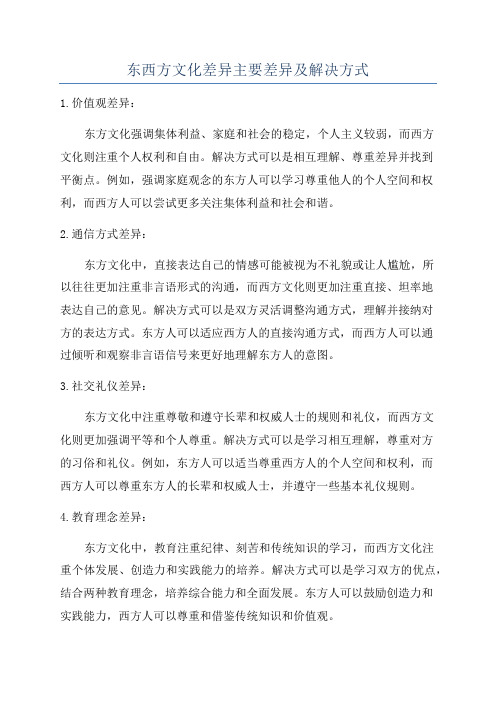
东西方文化差异主要差异及解决方式1.价值观差异:东方文化强调集体利益、家庭和社会的稳定,个人主义较弱,而西方文化则注重个人权利和自由。
解决方式可以是相互理解、尊重差异并找到平衡点。
例如,强调家庭观念的东方人可以学习尊重他人的个人空间和权利,而西方人可以尝试更多关注集体利益和社会和谐。
2.通信方式差异:东方文化中,直接表达自己的情感可能被视为不礼貌或让人尴尬,所以往往更加注重非言语形式的沟通,而西方文化则更加注重直接、坦率地表达自己的意见。
解决方式可以是双方灵活调整沟通方式,理解并接纳对方的表达方式。
东方人可以适应西方人的直接沟通方式,而西方人可以通过倾听和观察非言语信号来更好地理解东方人的意图。
3.社交礼仪差异:东方文化中注重尊敬和遵守长辈和权威人士的规则和礼仪,而西方文化则更加强调平等和个人尊重。
解决方式可以是学习相互理解,尊重对方的习俗和礼仪。
例如,东方人可以适当尊重西方人的个人空间和权利,而西方人可以尊重东方人的长辈和权威人士,并遵守一些基本礼仪规则。
4.教育理念差异:东方文化中,教育注重纪律、刻苦和传统知识的学习,而西方文化注重个体发展、创造力和实践能力的培养。
解决方式可以是学习双方的优点,结合两种教育理念,培养综合能力和全面发展。
东方人可以鼓励创造力和实践能力,西方人可以尊重和借鉴传统知识和价值观。
5.思维方式差异:东方文化倾向于综合思考、间接推理和含蓄表达,而西方文化注重逻辑、直接推理和清晰表达。
解决方式可以是双方学习思维方式的差异,理解对方的思考习惯并进行有效的沟通。
东方人可以适应西方人的逻辑思维,西方人可以学习东方人的综合思考和含蓄表达的方式。
总的来说,解决东西方文化差异的关键是相互理解、尊重和接纳。
通过学习和借鉴对方的优点,并且在沟通和交流中保持开放的态度,双方可以消除文化差异带来的隔阂,建立良好的合作关系。
中西方文化差异的总结
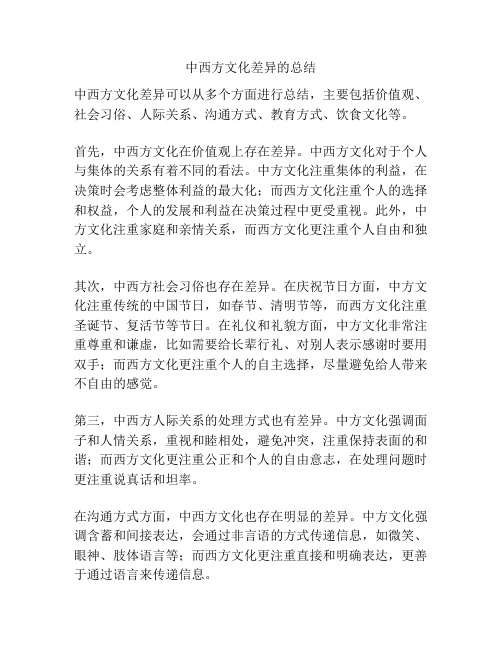
中西方文化差异的总结中西方文化差异可以从多个方面进行总结,主要包括价值观、社会习俗、人际关系、沟通方式、教育方式、饮食文化等。
首先,中西方文化在价值观上存在差异。
中西方文化对于个人与集体的关系有着不同的看法。
中方文化注重集体的利益,在决策时会考虑整体利益的最大化;而西方文化注重个人的选择和权益,个人的发展和利益在决策过程中更受重视。
此外,中方文化注重家庭和亲情关系,而西方文化更注重个人自由和独立。
其次,中西方社会习俗也存在差异。
在庆祝节日方面,中方文化注重传统的中国节日,如春节、清明节等,而西方文化注重圣诞节、复活节等节日。
在礼仪和礼貌方面,中方文化非常注重尊重和谦虚,比如需要给长辈行礼、对别人表示感谢时要用双手;而西方文化更注重个人的自主选择,尽量避免给人带来不自由的感觉。
第三,中西方人际关系的处理方式也有差异。
中方文化强调面子和人情关系,重视和睦相处,避免冲突,注重保持表面的和谐;而西方文化更注重公正和个人的自由意志,在处理问题时更注重说真话和坦率。
在沟通方式方面,中西方文化也存在明显的差异。
中方文化强调含蓄和间接表达,会通过非言语的方式传递信息,如微笑、眼神、肢体语言等;而西方文化更注重直接和明确表达,更善于通过语言来传递信息。
教育方式方面,中西方文化差异也较大。
中方文化注重传统的教育方式,尊重师长和教育权威,注重默默接受和记忆知识;而西方文化注重学生的主动性和创造性,鼓励学生思考和提出问题。
最后,中西方饮食文化也存在差异。
中方饮食注重荤素搭配,讲究食物的色、香、味,重视刀叉筷子的使用礼仪;而西方餐饮文化更注重多样化的口味和选择,使用刀叉的方式也有所不同。
总体来说,中西方文化差异体现在价值观、社会习俗、人际关系、沟通方式、教育方式和饮食文化等多个方面。
了解和尊重中西方文化的差异,有助于更好地进行跨文化交流和理解。
跨文化交流: 中西方文化差异和相互理解的方法
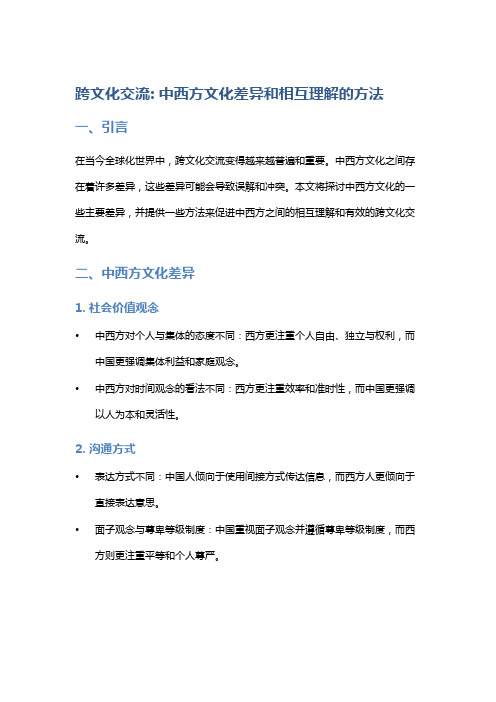
跨文化交流: 中西方文化差异和相互理解的方法一、引言在当今全球化世界中,跨文化交流变得越来越普遍和重要。
中西方文化之间存在着许多差异,这些差异可能会导致误解和冲突。
本文将探讨中西方文化的一些主要差异,并提供一些方法来促进中西方之间的相互理解和有效的跨文化交流。
二、中西方文化差异1. 社会价值观念•中西方对个人与集体的态度不同:西方更注重个人自由、独立与权利,而中国更强调集体利益和家庭观念。
•中西方对时间观念的看法不同:西方更注重效率和准时性,而中国更强调以人为本和灵活性。
2. 沟通方式•表达方式不同:中国人倾向于使用间接方式传达信息,而西方人更倾向于直接表达意思。
•面子观念与尊卑等级制度:中国重视面子观念并遵循尊卑等级制度,而西方则更注重平等和个人尊严。
3. 社交习惯•礼仪和礼节:中西方在社交场合的礼仪和行为规范上存在差异,例如礼物的选取和赠送方式等。
•对待个人空间的观念:中国人对私人空间有较高的要求,而西方则对公共空间的使用较为宽松。
三、相互理解的方法1. 尊重和包容尊重对方文化背景和价值观念是建立跨文化理解的基础。
我们需要意识到不同国家和地区有其独特的历史、传统和文化,在交流中要保持开放心态,接纳并尊重不同观点。
2. 学习文化知识深入了解对方文化是加深中西方之间相互理解的关键。
通过学习对方语言、历史、宗教、风俗习惯等,可以更好地了解他们的思维方式和行为准则。
3. 建立良好沟通渠道有效沟通是跨文化交流成功的关键。
具体来说,要充分利用适当的沟通工具,如语言翻译程序、身体语言等,并确保信息传达准确。
4. 注重非语言交流除了语言,非语言交流在跨文化交流中也起着重要作用。
包括肢体语言、面部表情和眼神接触等方式,可以帮助我们更好地理解对方的意图。
5. 尝试文化融合在跨文化交流中,宽容和包容是关键。
尝试融合两种文化的元素,并创造新的共同体验,可以增进相互理解和友谊。
四、总结中西方文化差异潜在地会导致沟通障碍和误解,但通过尊重、学习、良好沟通渠道、非语言交流以及文化融合等方法可以促进中西方之间的相互理解和成功的跨文化交流。
中西文化差异实例

中西文化差异实例
5. 教育价值观:中国文化中,教育被视为非常重要的价值观,家长和社会对教育的重视程 度较高。学习成绩和考试成绩被看作是评价个人能力的重要指标。而在西方文化中,个人发 展和创造力更受重视,教育更注重培养学生的独立思考和解决问题的能力。
这些只是一些中西文化差异的例子,实际上中西文化之间的差异非常广泛,涉及到许多方 面,如价值观、宗教信仰、社会结构等。这些差异也反映了不同文化背景下人们的思维方式 和行为习惯的差异。
中西文化差异实例
3. 饮食习惯:中国文化中,饮食被看作是社交和团聚的重要方式,人们通常会共享一些菜 肴和饭菜。而在西方文化中,个人的饮食习惯和口味更为重要,人们更倾向于独立点餐并注 重个人偏好。
4. 个人空间和隐私:在中国文化中,人们通常更接近并愿意共享个人空间,例如在公共场 所排队时,可能会比较靠近其他人。而在西方文化中,个人空间和隐私更受重视,人们更倾 向于保持一定的距离和私密性。
中西文化差异实例
以下是中西文化差异的一些实例:
1. 礼仪和礼节:在中国文化中,尊重长辈和上级是非常重要的价值观。人们通常会行礼、 称呼长辈或上级的称谓,并注重面子和礼貌。而在西方文化中,个人的自由和平等更为重要 ,人们更注重直接和开放的交流方式。
2. 时间观念:中国文化中,时间观念相对灵活,强调人际关系和情感的重要性。会议和约 会可能会有一定的延迟,而人际关系和交流的建立更重要。而在西方文化中,时间观念更为 注重准时和效率
中西方文化差异总结

中西方文化差异总结引言中西方文化是世界上最为重要和影响力最大的文化之一。
中西方的文化差异不仅体现在思维方式、价值观念、社会结构等方面,还反映在人际交往、教育观念、礼仪行为等方面。
了解中西方文化差异对于促进跨文化交流,增进文化认知,有效开展国际交往具有重要意义。
本文将总结中西方文化差异的主要方面,以期使人们更好地理解和尊重不同文化背景的人。
一、思维方式的差异中西方哲学思想的差异中西方哲学思想的差异根源于历史和文化的不同。
西方哲学以理性和个体为中心,强调逻辑思维、分析和实证研究。
而中国传统哲学则强调和谐、平衡以及人与自然的关系等价值观念。
中西方哲学思想的差异在思考问题的方式、价值观念的侧重以及解决问题的方法上体现。
沟通方式的差异中西方沟通方式的差异主要体现在表达方式和语言习惯上。
西方文化注重直接表达,追求明确和直截了当的沟通方式。
而中国文化则注重间接表达,尽量避免冲突和尴尬,更倾向于使用含蓄、委婉的语言。
另外,中西方在非语言沟通方面也存在差异,如肢体语言、面部表情等。
二、价值观念的差异社会关系的看待方式中西方在对待社会关系的看法上存在明显差异。
西方文化更注重个人主义和独立性,强调个体的自由和自主权利。
而中国文化则重视集体主义和家族观念,注重社会和谐以及对家庭和社群的责任。
这种差异体现在对待亲情、友情和礼仪观念上。
时间观念的差异中西方对待时间的观念和态度也存在差异。
西方文化注重时间的准确性和效率,更加注重精确计划和时间管理。
相比之下,中国文化注重时间的弹性和灵活性,更重视人际关系,对时间的看法较为宽容。
三、行为习惯的差异社交礼仪的差异中西方社交礼仪的差异主要表现在交往方式和礼节习惯上。
西方文化注重个人空间和个人隐私,注重直接而简洁的交流方式。
相比之下,中国文化注重尊重和面子,在交往中更注重细节和形式的礼仪。
比如,在进餐方面,西方文化注重快速就餐和使用刀叉,而中国文化则倾向于慢慢品味和使用筷子。
教育观念的差异中西方在教育观念上的差异主要体现在对待学习方式和学生发展的态度上。
中西文化差异

中西文化差异
中西文化差异可以从多个方面来比较,以下是一些主要的方面:
1. 社交礼仪:中西方的社交礼仪差异较大,比如在西方,人们经常用握手来问候和告别,而在中国,人们更倾向于用鞠躬或行礼来表示尊重和敬意。
2. 风俗习惯:中西方的风俗习惯也不尽相同,比如在西方,人们吃饭时会用刀叉,而在中国,人们则使用筷子;西方国家的圣诞、复活节等节日在中国并不普及。
3. 教育观念:中西方的教育观念也不同,比如在西方国家,注重自主学习和思维能力的培养,而在中国,则更注重考试成绩和应试能力。
4. 宗教信仰:中西方的宗教信仰也有差异,西方国家基督教是主流宗教,而在中国则有佛教、道教等多种宗教。
5. 思维方式:中西方的思维方式也不同,比如西方强调逻辑思维和分析能力,而东方则更注重整体思维和细节把握。
综上所述,中西文化差异存在于社交礼仪、风俗习惯、教育观念、宗教信仰、思维方式等多个方面,需要更深入的跨文化交流和理解。
中外文化20个差异

中外文化20个差异
1. 中国人重视团体,西方人重视个人。
2. 中国人崇尚权威,西方人崇尚实践。
3. 中国人崇尚谦虚,西方人崇尚自信。
4. 中国人以“家”为中心,西方人以“个体”为中心。
5. 中国人重“义”,西方人重“利”。
6. 中国人重“情”,西方人重“法”。
7. 中国人偏好形象思维,西方人偏好抽象思维。
8. 中国人偏好感性思维,西方人偏好理性思维。
9. 中国人崇尚礼仪,西方人崇尚平等。
10. 中国人喜好含蓄,西方人喜好直白。
11. 中国人讲究等级,西方人讲究平等。
12. 中国人安土重迁,西方人四海为家。
13. 中国文化崇尚和谐,西方文化崇尚自由。
14. 中国人饮食丰富,西方人饮食简洁。
15. 中国人餐具以筷子为主,西方人餐具以刀叉为主。
16. 中国人送礼讲究成双成对,西方人送礼讲究实用。
17. 中国人认为红色代表吉祥、喜庆,西方人认为红色代表血腥、暴力。
18. 中国人注重人情关系,西方人注重独立自主。
19. 中国人对年龄比较敏感,西方人对年龄不太在意。
20. 中国人喜欢热闹,西方人喜欢安静。
以上只是部分差异,实际上,中外文化之间的差异非常广泛,涵盖了生活的各个方面。
中西文化差异总结

中西文化差异总结中西方文化差异是一个复杂且有趣的话题。
通过对比,我们可以更好地理解两种文化的独特性和各自的优点。
本文将从不同角度探讨中西方文化差异,包括价值观、沟通方式、饮食习惯和节日等。
一、价值观差异价值观在文化中扮演着重要的角色。
中西方在价值观上存在明显的差异。
西方社会更加注重个人主义,追求个体的独立和自由。
而在中国文化中,强调集体主义和家庭观念更为突出。
中国人更加关注家庭和社会关系的平衡,乐意为集体和家庭做出牺牲。
二、沟通方式差异中西方的沟通方式存在一定的差异。
在西方文化中,人们更加直接和开放地表达自己的意见,喜欢展示个人的独立思考能力。
而在中国文化中,传统的沟通方式更加注重间接表达和含蓄。
人们会尽量避免直接回答问题,而是通过暗示、比喻和隐约的方式传达信息。
三、饮食习惯差异中西方的饮食习惯也存在着显著的差异。
传统的中国饮食文化重视均衡和协调,强调五味的平衡和食物的烹饪方式。
相比之下,西方餐饮文化更加注重个人口味的满足和多样性。
西餐中强调每个食材的独立味道,允许食物更加原生态地展现自身的特点。
四、节日传统差异中西方的节日传统也存在一些不同之处。
在西方文化中,圣诞节是一个重要且庆祝程度最高的节日之一。
而在中国文化中,春节则是最重要的传统节日,家人会团聚在一起,共度这个特殊的时刻。
此外,西方还拥有复活节、感恩节等一系列特色的节日,而中国则注重清明节、端午节等传统节日的庆祝。
五、教育观念差异中西方教育观念也有着显著的差异。
在西方文化中,注重独立思考和培养学生的创造力和创新能力。
学生被鼓励提出独特的见解和思考方式。
而在中国文化中,重视基础教育和强调集体主义观念。
学生过多的时间投入于学习基础知识和应试技巧的训练。
在中国,教育被视为一种提升社会地位和为家人争光的手段。
通过对比中西方文化差异的探讨,我们不但能够更好地理解两种文化的根源和特点,还可以更加宽容地看待不同的文化观念和习俗。
在全球化的时代背景下,跨文化交流和融合变得越来越重要。
中西方文化的主要区别是什么?

中西方文化的主要区别是什么?在全球化的今天,中西方文化的交流变得越来越频繁,也使得人们更加关注中西方文化的差异。
尽管世界各地的文化有着各自的特色,但中西方文化差异可能是最明显的之一。
以下是中西方文化的主要区别。
一、价值观中西方文化在价值观上存在显著差异。
在西方文化中,个人主义是一种常见价值观,重视个人自由、独立和自主权利。
这意味着每个人都应该追求自己的目标和利益。
不过,在中国文化中,家庭观念和家族关系是重要的价值观。
这意味着中国人往往将集体和家庭的利益放在个人利益之上。
西方文化也注重个人权利的保护,而中国文化重视权力的掌握。
中国的权力文化可以追溯到唐朝时期,而西方的人权和集权分别可以追溯到启蒙时代和中世纪。
这种差距导致了两种文化在权力和义务观念上的不同。
二、沟通和表达方式另一个不同之处是中西方文化在沟通和表达方式上的差异。
在西方文化中,人们通常会直接表达自己的想法和感受,但在中国文化中,人们会更加谨慎地表达自己。
这种文化差异可能是由于不同的历史和社会背景造成的。
在中国,大多数人更关注面子和社会地位,所以会更加优雅,圆润地表达自己的观点,尽可能地避免冲突。
而在西方,人们更加注重事物的实质和真相,愿意展示自己的态度,因此更愿意采取直截了当的方式来说话。
三、时间概念在西方文化中,人们通常注重时间的准确和高效。
时间就是金钱,所以人们非常珍惜时间。
在中国文化中,时间观念则不同。
时间是一种流逝的自然概念,所以中国人往往会更加闲散、不受时间约束,享受生活的方式。
他们更关注与他人的时间在一起,更关注集体的节日和庆祝活动,更加珍惜人际关系的融洽和和谐。
四、审美标准在艺术和审美领域,中西方文化同样有着明显的差异。
在西方文化中,人们注重人与自然之间的关系,他们认为艺术和大自然之间存在着紧密的联系。
人们欣赏极简主义和现代主义风格的艺术品,他们欣赏自由和独立的精神。
在中国文化中,人们注重人与社会之间的关系,他们喜欢表达共性和集体性,崇尚完满而美好的人际交往关系。
中西方文化差异的例子

中西方文化差异体现在多个方面,以下是一些具体的例子:1. 交际语言和问候方式:-在中国,常见的问候方式是询问对方的饮食和行程,如“吃了吗?”或“上哪呢?”,这体现了对他人生活的关心和亲近感。
-而在西方,人们通常使用简单的问候语如“Hello”、“Hi”或者按照时间来打招呼,如“Good morning”、“Good afternoon”和“Good evening”。
英国人可能会以谈论天气作为开场白。
2. 称谓和姓名使用:-在中国文化中,直呼其名通常是亲密关系的体现,而在不熟悉的人之间,会使用更正式的称呼如姓氏加上职务或尊称。
-西方文化中,人们通常更倾向于直接称呼对方的名字,即使在较为正式的场合也是如此。
3. 教育观念和方式:-中式教育往往强调集体主义、纪律性和应试能力,教师在教育过程中扮演主导角色。
-西方教育则倾向于个人主义、批判性思维和创新能力的培养,学生在学习过程中有更多的自主权。
4. 法律观念和法制精神:-西方社会法律观念深入人心,法制精神渗透到生活的各个方面。
例如,个人权益受到侵害时,人们更倾向于通过法律途径解决。
-在某些东方文化中,调解和和谐可能被优先考虑,法律诉讼被视为最后的手段。
5. 餐饮习惯和餐桌礼仪:-中餐常常是多人共享菜肴,使用筷子,并且有敬酒的文化。
-西餐则通常每个人有自己的餐盘,使用刀叉,餐桌礼仪包括使用不同的餐具和正确的用餐顺序。
6. 家庭结构和价值观:-中国传统家庭观念强调孝道和家族延续,子女有照顾年老父母的责任。
-西方家庭观念更注重个人独立和自我实现,成年子女与父母的关系相对更为平等。
这些只是中西方文化差异的一些例子,实际上,文化差异还表现在许多其他领域,如艺术、哲学、宗教和社会习俗等。
理解这些差异对于跨文化交流和国际合作至关重要。
中西文化差异比较例子

中西文化差异比较例子中西文化差异,真是个有意思的话题。
比如说,西方人喜欢直接表达自己的想法,而中国人则更注重含蓄。
想象一下,在美国,一个人可能会直截了当地说:“我不喜欢这个。
”而在中国,可能会用“这个还可以”来表达不满。
这样的交流方式,让人觉得文化的差异不仅仅是语言的问题,背后还有深厚的历史和社会背景。
一、价值观念1.1 在西方,个人主义是根深蒂固的理念。
每个人都被鼓励追求自己的梦想。
比如,美国梦,人人都有机会。
人们努力奋斗,渴望成功。
反观中国,集体主义更为突出。
大家的目标常常与家庭、社会紧密相连。
家庭荣誉,往往比个人成就更重要。
1.2 西方人习惯追求自我表达,倾诉内心的真实感受。
他们的社交场合中,分享个人故事是一种常态。
而中国人则常常选择“走心”的方式,避免直接触及敏感话题。
朋友间的互动,多是一种默契。
二、教育观念2.1 教育在中西文化中占据不同的位置。
在西方,教育更注重培养独立思考能力。
课堂上,学生们积极提问,参与讨论。
教师的角色更像是引导者,而不是权威。
而在中国,传统的教育方式往往以灌输为主。
考试成绩决定一切,学习压力巨大。
2.2 这种差异也体现在家庭教育上。
西方父母倾向于让孩子自由探索,犯错被视为成长的一部分。
孩子们可以尝试各种活动,培养多元化的兴趣。
而在中国,父母更倾向于规划孩子的未来,补习班、特长班一应俱全,目的只有一个:成绩好。
2.3 这也导致了中西文化对成功的定义有所不同。
在西方,成功可以是各种形式的:艺术、科技、甚至是生活方式。
而在中国,成功往往被简化为高学历、高收入。
三、社交礼仪3.1 社交方面,中西文化有很大差异。
西方人常常通过握手、拥抱等肢体接触表达友好。
眼神交流也非常重要,显示出真诚和信任。
而中国人则更注重礼节,比如见面时的问候和相互的尊重,避免过多的肢体接触。
3.2 当然,节日庆祝也各有特色。
西方的圣诞节、感恩节,家人团聚,热闹非凡。
中国的春节,则是家庭团圆的时刻,象征着团结和和谐。
- 1、下载文档前请自行甄别文档内容的完整性,平台不提供额外的编辑、内容补充、找答案等附加服务。
- 2、"仅部分预览"的文档,不可在线预览部分如存在完整性等问题,可反馈申请退款(可完整预览的文档不适用该条件!)。
- 3、如文档侵犯您的权益,请联系客服反馈,我们会尽快为您处理(人工客服工作时间:9:00-18:30)。
The Differences between Western Invitation and Eastern InvitationLet me start the research with an excerpt from a letter written by Andy to his friend James. I am sure you will get something.Dear James,Teaching in China is a real pleasure, but people here can sometimes be a little mean with their hospitality. Yesterday I was invited to an official banquet in the evening by the university. As you know, I enjoy Chinese food and would have loved to have gone, but for some reason Janet was not included in the invitation. Naturally I couldn‟t accept and leave the dear old wife at home so I had to make an excuse to get out of it. Can‟t think why they should want to snub her in that way, but it has made both of us feel that we are not really welcome…From the letter, we may see a sharp cultural difference here and may realize that lack of such differences may lead to misunderstanding, even to the extent of a good-will gesture being taken amiss. Andy is a foreign teacher teaching in a Chinese university. He received an invitation to an official banquet given by the university, but he didn‟t accept it. He complained that his wife was not invited and he thought that they not welcome. You may think that Andy‟s accusation of meanness is unfair-his hosts were not being ungenerous. However, his complaint is understandable given his lack of knowledge of Chinese customs. Expectations about when spouses should be included in invitations differ between China and the West. Generally speaking for invitations to any meal taking place in the evening, ranging from those given at someone‟s homethrough to dining out together or attending formal banquets, both husband and wife will be included. This is not expected in the case of mid-day meals, probably because couples often work in different places and some jobs involve taking a …working lunch‟ with clients or colleagues. Here in China, however, it is quiet common for only the husband or wife to be invited to a meal, either in work units or between friends, and neither husband nor wife will feel offended if one of them is not invited.∙Let us talk about the conventional dialogue between two English people who know each other well. Michael gree ts Peter,‟ Hi, Peter, how‟s things going?‟It isinformal greeting between acquaintances. Before giving the invitation, Michaelasks,‟Look, what are you up to this Friday?‟ Such a question is asked for the intention of invitation here. Michael expresses his invitation in this way,‟We are wondering if you and Jean would like to come over to our place for a bite to eat.‟ And peter replies,‟ Sounds lovely.‟ As English dinner usually revolve around one main course rather that many different dishes, hosts often ask beforehand whether guests do not like anything to avoid everyone being disappointed. There is also a sizable minority of vegetarians, and hosts would not enjoy the planned …roast‟. A roast is a large piece of meat such asa leg of lamb or a chicken cooked inside an oven. It is usually served with potatoesand one or two other vegetables such as cabbage and carrots.∙Li Hong is a university student. Her class is going to have a party on Saturday evening and her classmates ask her to invite their British teacher, Jane, to the party.Jane is married and her husband is called John. One way in which the conversation might run is like this:∙Li: Hi, Jane, we are doing to have a party in our classroom this Saturday evening. We were wondering whether you and John would like to come.∙Jane: Oh, great, love to. When will it begin?∙Li: At seven.∙Jane: Thank you! Look forward to it.∙Before oral invitations, people may send written invitations.∙ A very formal written invitation:∙Mr. and Mrs. Anthony∙Request the pleasure of the company of∙Mr. Frederick Parsons∙At dinner∙On Tuesday, 11 June at 8.30 p.m.∙Please reply 9 Mill Lane Leeds∙At last, let us see hoe English native speakers negotiate a time to meet. Their way of setting on a time is quite similar to our own, that is, normally one gives or suggests a time, then the other may find it not suitable and suggest another time, and finally a time is fixed which suits both. However, if a person who is invited doesn‟t want to accept the invitation, things tend to be somewhat different. For instance, an English native speaker‟s explanation for not being able to go is usually short and not detailed, simply by saying …I am sorry, I cannot get away or I am tied up the whole week‟ or … I have got something fixed up for then‟. A Chinese speaker‟s explanation, on the other hand, tends to be more detailed and longer to assure the person whoinvites that he‟s really got something important to do and he usually makes cleaner what he is g oing to do. The purpose of doing so, as we say,‟ to give the other person face‟, to reassure the other person of our esteem for them. Thus, if a Chinese person gives a detailed explanation to an English native speaker who issues an invitation, the English native speaker may feel that the detailed explanation is not really necessary. Conversely, the English native speaker‟s short, undetailed explanation may strike us as a bit impolite if we are unaware of their customs.∙ 1. What are the differences in the concepts of friends between the Chinese and American cultures?An American may feel that a friend needs privacy to “work out” a problem.Many Americans want such time alone when they have problems. So American may want to give you your privacy even i f you don‟t want it, while a Chinese friend may be with you all the time when you are in trouble, neglecting your privacy, because they don‟t have the concept of “privacy” between friends.∙ 2. Discuss the feasibility of a synthesis of Eastern culture and Western culture.Eastern culture and Western culture have their unique characteristics, including both the advantages and disadvantages. It is really great to see the synthesis of them. And in reality, Eastern culture and Western culture have a trend to blend with each other, with the frequent communication among international countries.So it is possible to see a synthesis of Eastern culture and Western culture in future.∙∙∙。
